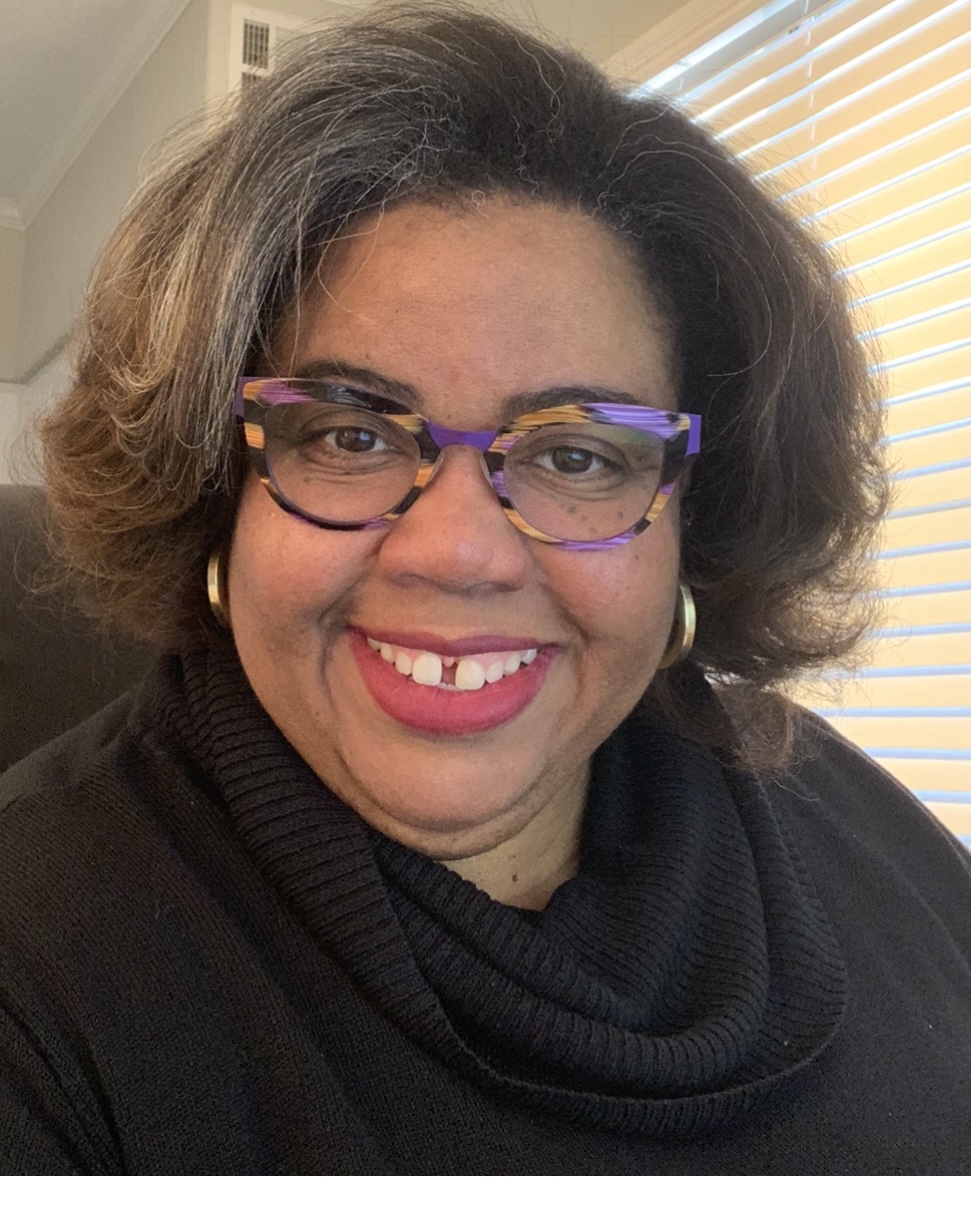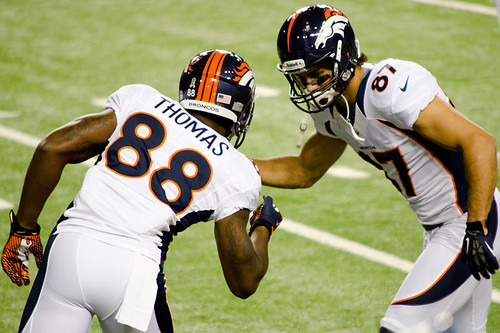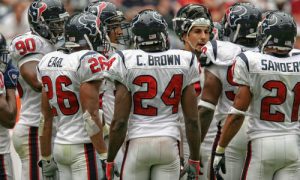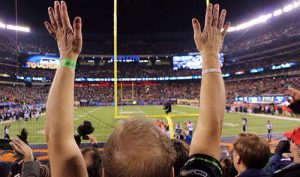The Denver Broncos and the Las Vegas Raiders have accomplished this summer what no other National Football League teams have been able to do – diversify their highest-ranking leadership positions.
The Walton-Penner family agreed in early June to buy the Broncos for $4.65 billion and brought in financier Mellody Hobson and former U.S. Secretary of State Condoleezza Rice as co-owners, becoming the first Black women in an NFL ownership role. Meanwhile, the Raiders hired Sandra Douglass Morgan as the first Black president of an NFL team.
The three women have joined the NFL at a time when the league has been roundly criticized for inequality, with former Miami Dolphins head football coach Brian Flores filing a class action lawsuit alleging racism in hiring practices. Looming questions for business, sports, and investigative journalists to answer are: Will the presence of Hobson, Rice and Morgan lead to more women and minority hires in leadership positions in the NFL? And is diversifying leadership just good business or a way for the NFL to atone for its past?
“There are certainly inflection points in sports right now where observers are willing to declare that this is the moment of reckoning and certainly Brian Flores’s lawsuit occasioned those observations,” said Abraham Khan, assistant professor of communication at the University of Arkansas. Khan specializes in the study of popular culture with an emphasis on sports and racial politics. “One of the arguments that was often made in relation to the Flores lawsuit was the idea that if you want more Black coaches in the NFL, you’re going to need more Black owners.”
In addition to the Flores lawsuit, NFL Commissioner Roger Goodell has been weighing the effectiveness of the Rooney Rule – named after the father of Pittsburgh Steelers President Art Rooney II. The rule, according to “Sporting News,” was designed to “ensure more equitable hiring practices among the league’s teams as it relates to minority candidates for jobs and front office positions.” But critics say the rule is ineffective considering there are no harsh penalties associated with it.
“There is no such thing as a one-size-fits all or a magic bullet,” said Scott Brooks, director of Arizona State University’s Global Sport Institute, about the other ways the NFL could build upon minority leadership. “Diversifying leadership cannot simply be a movement, an effort driven in a specific time, but rather it needs to be a shift, a change in how things are done, measured, and assessed continuously with appropriate responses to drive change. And it has to take place at various levels.”
Institutional racism starts at the top
Around 70% of players in the NFL are men of color, but there are only three Black head coaches among the 32 teams: Lovie Smith of the Houston Texans, Michael McDaniel of the Miami Dolphins, and Mike Tomlin of the Pittsburgh Steelers. Only two people of color own NFL teams: Jacksonville Jaguars owner Shad Khan and Buffalo Bills owner Kim Pegula. And unlike players and coaches, NFL ownership rarely changes hands. Most new owners acquire their stakes through family, either through marriage or at the bequest of their parents. The high numbers of minority players and low numbers of minority owners and head coaches lead fans and critics to question whether the NFL has fostered an atmosphere of institutional racism.
“Part of the problem with a term like institutional racism or systemic racism is that there’s always a disconnect between intent and effect – between state of mind or consciousness,” Khan said. “The reason why there was a call to add more minority owners among the NFL was because you could close the gap between intent and effect. In other words, a Black owner is going to have life experience and the consciousness to be able to cast prejudices aside.”
The Institute for Diversity and Ethics in Sport (TIDES) offers resources on gender and race in amateur, collegiate and professional sports. The organization issues racial and gender report cards, which assess the hiring practices of women and minorities in sports throughout the United States. Each of the report cards analyzes hiring data from each season. Jobs ranging from head coaches, assistant coaches, C-suite executives, senior administration and professional staff are included in the TIDES report card assessment.
For the 2021 football season, the NFL received an overall grade of B+ for racial hiring practices and a C+ for gender hiring practices. However, they received an F for racial and gender hiring for team owners.
“Across sports – if you look at the data – and this is certainly true for the NFL and the NBA, the majority of players are people of color. The majority of leadership is not,” said Brett Kurland, assistant dean of instruction and partnerships at Arizona State University’s Walter Cronkite School of Journalism and Mass Communication, and an expert in sports journalism. “It’s so incredibly important to have diversity in gender and ethnicity at the highest level. That leads to more hiring at (other) levels.”
NFL Coaches vs. NBA Coaches
When the 2021 report card was compiled there were five people of color listed as head football coaches: Flores, Tomlin, David Culley of the Houston Texans, Ron Rivera with the Washington Commanders, and Robert Selah of the New York Jets. The TIDES report card also listed 12 women in assistant coach jobs at the beginning of the 2021 season. Many of these assistant coaches participated in short-term diversity coaching fellowships. It’s unclear how many still work with the NFL.
ASU’s Global Sport Institute also published a report on NFL head-coach hiring in the Rooney Rule Era. According to the study, the number of minority head coaches has dipped and spiked dramatically from 2002 through 2020.
“Our most recent field study on NFL head coach hiring since 2003 (the inception of the Rooney Rule), shows that the NFL has peaks followed by valleys in hiring head coaches of color, but both the Broncos and Raiders could break the trend by hiring more diverse people throughout the organization,” said Brooks, who is also an associate professor of sociology at ASU’s Sanford School of Social and Family Dynamics.
In comparison, the National Basketball Association gets an A for racial hiring and a B for gender hiring according to the TIDES report card. This summer, the NBA reported that half of their head basketball coaches are minorities. According to NBC Sports, eight coaching jobs in the last 12 months have been filled by Black candidates, meaning 15 of the 30 franchises have hired Black head coaches.
“It means a lot,” Golden State assistant coach Mike Brown told NBC Sports. Brown was one of the eight Black head coaches that were hired. He will work as head coach for the Sacramento Kings. “When my son, and my oldest son’s about to have his first son, when they turn on the TV and they see people that look like them leading an NBA team on the sidelines, it can be inspiring.”
What Hobson, Morgan and Rice bring to the table
Hobson, Morgan and Rice had long-standing and prominent careers before being named to the C-suite of the NFL.
Mellody Hobson, 53, was named minority owner of the Denver Broncos in early June. She was raised in Chicago and attended Princeton University. She’s had a long career in finance and has worked as president of Ariel Investments for the last 22 years. She’s also served on several company boards including Estee Lauder, DreamWorks, Groupon, and Starbucks. In 2019, her alma mater named a new residential college after her. According to Business Insider, the college is the first at Princeton to be named after a Black woman. Hobson is also the wife of Star Wars creator George Lucas. The two have a daughter.
Broncos quarterback Russell Wilson and his wife, R&B singer Ciara, met with Hobson and Lucas shortly after the announcement of her being minority owner.
“What a tremendous accomplishment and what a gift to be able to do what she’s going to do,” Wilson said to USA Today’s Broncos Wire. “She’s the first Black woman to do this. This is a big deal. This is history. I think it’s gone over people’s heads a little bit. It’s news. It’s a tremendous representation for minorities, but Blacks in particular.”
No formal announcement was made about Hobson’s ownership from the Denver Broncos. But on July 11, the Broncos announced Rice, 67, as the second Black owner in the NFL.
“We’re pleased to welcome former Secretary of State Condoleezza Rice to our ownership group. A highly respected public servant, accomplished academic and corporate leader, Secretary Rice is well known as a passionate and knowledgeable football fan who has worked to make the sport stronger and better,” said Rob Walton in a statement. “She is the daughter of a football coach and served on the inaugural College Football Playoff Committee. She moved to Denver with her family when she was 12 years old and went on to attend the University of Denver for both college and graduate school. Her unique experience and extraordinary judgment will be a great benefit to our group and the Broncos organization.”
Rice is the director of Stanford University’s Hoover Institution, a public policy think tank. She was the first Black woman to work as U.S. Secretary of State. Plus, she was the first woman to serve as U.S. National Security Adviser.
“One thing that was always known about Condoleezza Rice is that she is a huge football fan,” Khan said.
Anytime Goodell “does something completely boneheaded” Rice’s name gets floated to take his place, Khan said. Rice’s name was also floated as a potential head football coach for the Cleveland Browns at one time; it’s unclear if that was a serious consideration or a recommendation from fans.
“It is an honor to be part of this ownership group,” Rice said in a statement. “Football has been an integral part of my life since the moment it was introduced to me, and I am thrilled to be a part of the Broncos organization today.”
It’s unclear how Rice and Hobson became involved with the Broncos. However, in March, NFL owners approved a resolution endorsing diversity in franchise ownership. As for their roles moving forward, The Athletic reports that Hobson “will have a significant role in the operation of the franchise.”
“I’d be very curious to know what the social connections were,” Khan said. “I’ve read a few articles but they’re all very straightforward … and no one’s really offering any kind of background on how this relationship between the Walmart group … and Condoleezza Rice and Mellody Hobson … came together. What I have not seen is the NFL overtly framing this as a celebration of diversity.”
Khan added, “Can a change in ownership influence hiring patterns in positions of power? That’s the question. Now, I’m not sure what the answer to that question will be.”
Morgan
On July 7, the Las Vegas Raiders announced that Sandra Douglass Morgan, 44, will be the new president of the franchise. She’s the second woman leading the Raiders, after Amy Trask who served as CEO from 1997 to 2013. In addition to Morgan and Trask, the Raiders also hired Art Shell — the NFL’s first Black head football coach in 1989.
For Morgan, being named the first Black woman to lead an NFL team is just the latest achievement of firsts. She was the first Black woman to chair Nevada’s Gaming Control Board. She’s also worked with AT&T and served as city attorney for North Las Vegas.
“I am thrilled that Sandra has agreed to join the Raiders family,” Raiders owner Mark Davis said in a statement. “Her experience, integrity and passion for this community will be invaluable to our organization. From the moment I met Sandra, I knew she was a force to be reckoned with. We are extremely lucky to have her at the helm.”
Morgan’s hiring comes at a crucial time for the Raiders. In addition to moving to Las Vegas, they also experienced trials due to former head football coach John Gruden, who resigned after sending numerous emails containing racist, misogynistic and anti-LGBTQ language, according to the TIDES 2021 NFL Report Card.
Kurland said that the team has clearly “had its fair share of dysfunction.”
“Given the challenge that organization has had, I think it’s important to have her there right now,” Kurland added.
ASU’s Brooks applauds the success of each of the women. He added, however, that the women cannot work in isolation.
“It goes without saying that these are extraordinary people with amazing accomplishments,” Brooks said. “Each has shown more than individual success. They’ve successfully led others. They can’t do it alone though – changing the NFL’s record on diversity requires a more intentional, sustained and multi-tiered effort by clubs and the league. In addition to hiring, clubs and leagues must focus on equity (such as, equal pay across race and gender) and the working environment to promote inclusion and belonging.”











